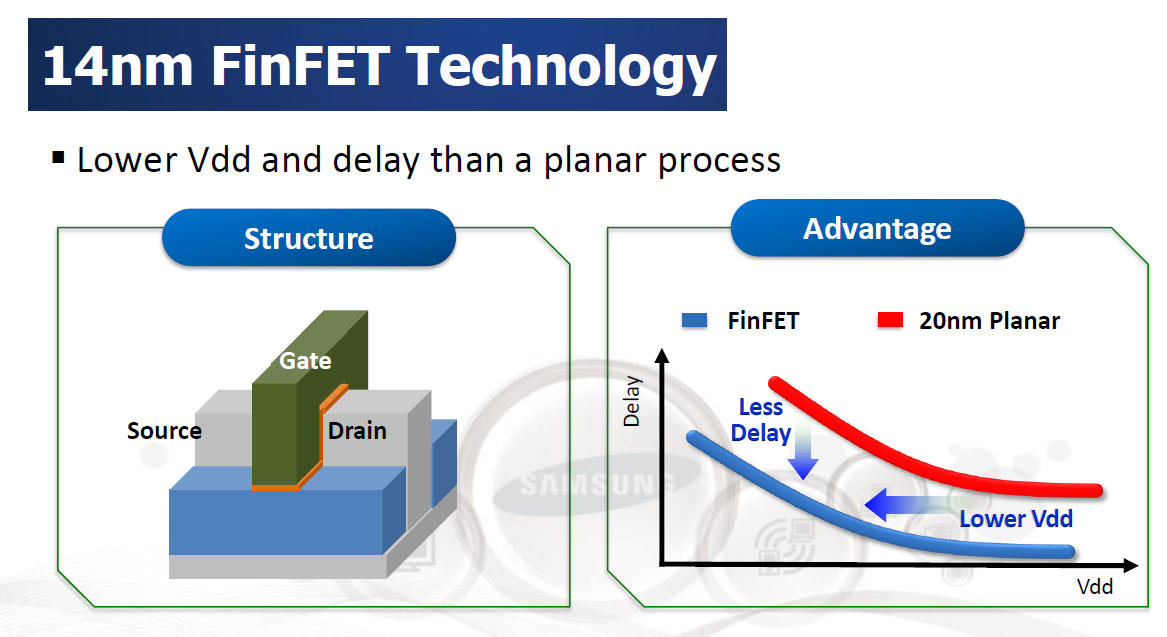Samsung Begins Producing 14nm Chips That Could Power The Apple Watch
Samsung is racing to beat TSMC to market with 14nm FinFET chips, after it already won this year by a hair when it launched a 20nm chip of its own in the Galaxy Alpha about two months before Apple launched its new iOS devices with the first 20nm TSMC-made chips.
If Samsung already has its 14nm chips in production, then the company will probably enjoy an even bigger lead on TSMC next year. It usually takes another two quarters or half a year to see chips land in devices, so we could see 14nm chips made by Samsung as early as next spring.
It's unclear who the first customer is, but it's likely to be Apple. The 14nm FinFET chips may not be for a smartphone or tablet, but for the Apple Watch. Right now everyone seems to be struggling to give their smartwatches more than a day or two of battery life, especially if they use LCD or AMOLED displays instead of the more efficient Mirasol panels from Qualcomm.
The main problem is that the batteries can't be too big; otherwise, the smartwatches become bulky and heavy, and the processors are too power-hungry for such small batteries. However, OEMs can't compromise too much on performance either, because these watches tend to run full-blown mobile operating systems under the simpler UIs.
Going to 14nm could either make the chips significantly more efficient, or cut the die size so the OEM -- in this case Apple -- can increase the size of the battery (which would add the drawbacks mentioned above). Samsung's 14nm FinFET chips could reportedly use 35 percent less electricity, or take 15 percent less space, compared to 20nm chips.
Samsung is currently supplying Apple with NAND flash and DRAM. This year was the first that Apple didn't use Samsung to manufacture its chips for iOS devices. If Samsung has indeed become Apple's supplier again for the Apple Watch and this deal goes well, then Apple may want Samsung to make its chips for iOS devices again. However, by autumn of next year, TSMC should have its own 16nm FinFET process ready as well, and Apple may choose to go with TSMC again or use both companies to manufacture its chips.
Samsung is also rumored to give AMD access to its 14nm process next year, although that may happen indirectly through the deal Global Foundries made with Samsung, in which it gets to use the same 14nm technology. Samsung's 14nm FinFET process, if adopted early by AMD as well, could put the company on a much more competitive track with Intel in the PC market. Intel has already begun making 14nm chips, but only in small quantities, and it won't be until the middle of next year that the company will begin mass production.
Get Tom's Hardware's best news and in-depth reviews, straight to your inbox.
Follow us @tomshardware, on Facebook and on Google+.
Lucian Armasu is a Contributing Writer for Tom's Hardware US. He covers software news and the issues surrounding privacy and security.
-
iron8orn AMD might get 14nm chips! looks like all the HSA partnerships are really starting to pay off.Reply -
kenjitamura Reply
I outright disbelieve AMD will have any 14 nm products out in 2015 and am skeptical of seeing any 2016 14 nm parts. They're most likely going to be on 20 nm in 2015 and will stay on that node until sometime 2017.14790827 said:AMD might get 14nm chips! looks like all the HSA partnerships are really starting to pay off.
-
BaronMatrix Actually a search shows that AMD is in qualification for 14LPE and should be making chips in Feb-Mar and qual for 14LPP will happen by Q2.Reply
It seems obvious that they are building Zen and K12 with 14nm.. SkyBridge is 20nm..
It's possible that they can maintain the cadence of a new APU every year depending on how far they are with them... I believe Zen\K12 are pin-compatible like SkyBridge...
The question is if GloFo will be making GPUs... -
Shin-san I can believe that AMD will have a 14nm product for one reason: console makers with huge cash coffers (Microsoft and Sony). It's in the console makers' best interest for AMD to be able to use a 14nm-16nm process. Hard to say if it will be the reality, but that would be a huge reasonReply -
EasyLover AMD is very likely to be producing 14nm enabled products. That is the future way to go.Reply -
Darkk If Apple quit pi$$ing Samsung off with lawsuits just maybe Samsung will supply it. Right now they don't have to as they are holding the cards.Reply
-
ericburnby ReplyIf Apple quit pi$$ing Samsung off with lawsuits just maybe Samsung will supply it. Right now they don't have to as they are holding the cards.
You do realize that Samsung Semi and Samsung Mobile are two different divisions, right?
More like Samsung Semi is pissed that Samsung Mobile keeps copying Apple and jeopardizing their lucrative multi-billion dollar contract to supply Apple with components. Samsung Semi LOVES Apple and the billions they spend. It's Samsung Mobile and Apple that have issues.
-
g-unit1111 Funny that Samsung makes the chips that power Apple devices, then Apple takes their profits from the sale of these devices and turns around and sues Samsung for patent infringement. Ironic.Reply -
ccampy Yes Samsung steals apples ideas for rectangular devices with rounded corners and swiping on a touchscreen to interact with itReply
High tech stuff the deserves patents

